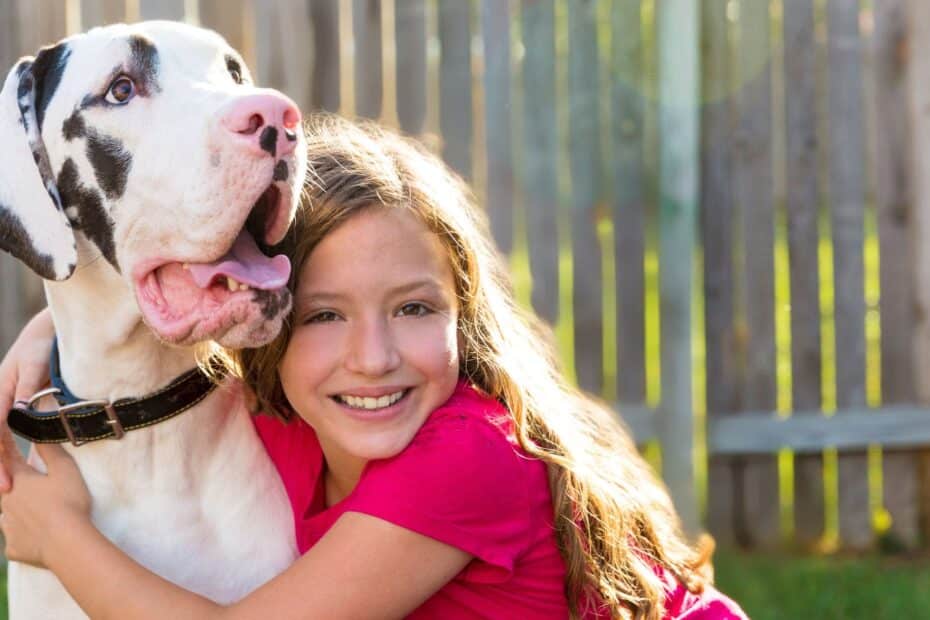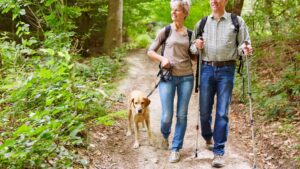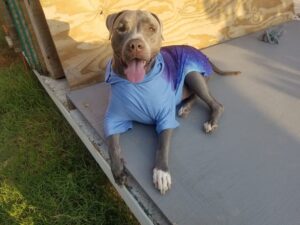Introduction:
Big dogs sometimes don’t get the attention they deserve. People may think they’re too loud, too big, or maybe a bit scary. But big dogs can be just as sweet and kind as the tiniest puppies. Choosing to adopt a big dog can bring a world of happiness and many unexpected benefits. These gentle giants, with their big eyes and even bigger hearts, can fill a home with love, laughter, and a sense of adventure.
Big Dogs Are Kind
Big dogs have a way of being incredibly gentle. They seem to understand just how strong they are and are often very careful not to be too rough. They don’t bark as much as smaller dogs and they rarely snap at people. This gentle behavior makes them ideal friends for families, especially those with children who desire a friendly giant to play with.
Big dogs Love to Play Outside
Big dogs are full of life and absolutely love the great outdoors. They’re perfect for anyone who enjoys being active outside, like runners, hikers, or bikers. With a big dog by your side, you’ll always have a reason to venture into the fresh air and have fun. They need to stretch their legs, run freely, and play to their heart’s content, which means you’ll get plenty of exercise just keeping up with them.
Big Dogs and Kids
Big dogs and children can be the best of friends. These dogs are often incredibly patient and can put up with a lot from little hands. They help children learn how to be careful and kind to animals. Big dogs often naturally understand how to be gentle with kids, and they can handle the playful, sometimes chaotic energy that children bring to the game.
Big Dogs Can Be Independent
Big dogs have a lovely independent streak. If you have a job that keeps you away from home or if you’re someone who has to take care of lots of errands, many big dogs can handle being alone better than their smaller counterparts. They won’t create a fuss when you leave for the day, and they’ll greet you with boundless joy when you return.
Taking Care of Big Dogs
Caring for big dogs is often simpler than people think. Many of them have short coats that require minimal grooming. This means you won’t have to spend as much time or money on their care as you might with some small, fluffy dogs. And when it comes to bath time, many big dogs enjoy the water, making it a fun experience rather than a chore.
Big Dogs Love to Cuddle
Their large size doesn’t mean big dogs aren’t affectionate. In fact, many love nothing more than curling up with their human friends for a cozy nap or relaxing at your feet after a long day. Whether on the couch or in bed, they’re always ready for a snuggle and have a comforting presence that can make any house feel like a home.
Big Dogs Keep You Safe
Their impressive size can help keep your home safe. When you have a big dog around, you might feel more secure. They are natural protectors and have a strong presence that can act as a deterrent to unwanted visitors, ensuring that your family and home are well-guarded.
Big Dogs Help You Exercise
Since big dogs need lots of walks and playtime, they’re fantastic at helping you maintain an active lifestyle. They give you an excellent reason to go for a walk or play fetch in the park, making sure you both get the physical activity you need. Regular walks with a big dog can be a great way to explore new places, meet other dog owners, and enjoy the beauty of nature.
Big Dogs and Older People
Big dogs can be incredible companions for the elderly. They offer constant company, a sense of security, and a reason to stay active and engaged with the world. A big dog’s presence can bring comfort and joy to an older person’s life, offering a steady routine and unconditional love.
Benefits of Big Dogs
Big dogs often come with a certain level of training, especially if they’re a bit older, which can be a relief for those who want to skip the challenging puppy phase. They also provide a routine; their need for regular walks helps you maintain a daily schedule, which can be beneficial for your own health and well-being.
More Love to Give
Big dogs seem to have an endless supply of love to give. They are intuitive and can often tell when you’re feeling down, offering their company as comfort. They’re not just pets; they’re members of the family, great listeners, and loyal companions through thick and thin.
Big Dogs in the Community
Big dogs can also play a significant role in community settings. Their calm nature and intelligence often make them excellent candidates for service or therapy work. They’re also popular in educational settings, participating in programs where children read to dogs, helping the kids feel more relaxed and confident in their reading abilities.
Adoption Tips for Big Dogs
When it comes to adopting a big dog, there are some special things to consider to make sure you’re ready to welcome one of these gentle giants into your home.
- Assess Your Living Space
First, look at your living space. Big dogs need enough room to move around comfortably. If you have a yard, make sure it’s securely fenced to give them a safe place to play. Inside, they’ll need a cozy spot to sleep and rest that’s all their own.
- Consider the Breed
Different breeds of big dogs have different needs and personalities. Some are laid-back, while others are full of energy. Do your research to find a breed that matches your lifestyle. For instance, if you love long hikes, a Bernese Mountain Dog might be a good fit. If you’re looking for a laid-back companion, a Great Dane is known for being a gentle “couch potato.”
- Meet Their Exercise Needs
Big dogs often need a lot of exercise. Make sure you have the time and energy to take them on regular walks or runs. Some big dogs love to play fetch or frisbee, which can be a great way to burn off energy and bond with your new pet.
- Check Your Budget
Owning a big dog can cost more than a small one. They eat more food, and sometimes vet bills can be higher, too. Make sure you’re prepared for the cost of care, including regular check-ups, flea and tick prevention, and any unexpected health issues.
- Prepare for Training
Even if your big dog comes with some training, you’ll want to continue training them to follow commands, walk nicely on a leash, and behave well around people and other dogs. Big dogs can be strong, so training is essential to ensure they’re good canine citizens.
- Understand Their Lifespan
It’s important to know that big dogs often don’t live as long as smaller dogs. While it’s sad to think about, you should be prepared for a shorter time with your pet and make sure to give them the best life possible.
- Socialization Is Key
Big dogs need to be well-socialized. They should be comfortable around different types of people, environments, and other animals. Good socialization means taking your dog to various places and exposing them to different situations in a controlled and calm manner.
- Think About Health
Some big dog breeds have specific health concerns. Before adopting, find out about any potential health issues and discuss them with a vet. You’ll want to know how to care for your big dog as they get older and how to keep them as healthy as possible.
- The Adoption Process
When you’re ready to adopt, consider visiting local shelters or breed-specific rescue organizations. Shelter staff can help match you with a dog that fits well with your family. Spend time with potential pets to see how you connect. Ask questions about their history, health, and behavior to make sure you’re the right match for each other.
- Bringing Your Big Dog Home
Once you’ve decided on a dog, make sure you have all the supplies you need before bringing them home. This includes a big enough bed, water, and food bowls, a sturdy leash and collar, and plenty of toys. Help them settle in by establishing a routine right away, including feeding times, walks, and playtime.
- Be Patient and Loving
Finally, remember that adopting any dog, especially a big one, is a big commitment. It will take time for them to adjust to their new home and family. Be patient and give them lots of love and attention as they settle in. With the right preparation and care, your big dog will be a loving addition to your family for years to come.
Training Tips for Big Dogs
Training a big dog can be a rewarding experience that strengthens your bond and ensures they are a well-behaved member of the family. Here are some tips to guide you:
- Start with Basic Commands
Teach simple commands like sit, stay, come, and down. These basics form the foundation of good behavior. Use positive reinforcement with treats and praise to reward your dog for following commands.
- Consistency is Key
Be consistent with your commands and your expectations. If jumping on people is not allowed, it’s never allowed, not even when you’re in a good mood and don’t mind.Big dogs can be strong-willed; consistent rules help them understand what’s expected.
- Socialize Early and Often
Introduce your big dog to different people, dogs, and situations early in their life.
Regular socialization helps prevent fear and aggression and makes outings more enjoyable.
- Leash Training
Teach your dog to walk nicely on a leash without pulling. A harness can give you more control without putting strain on the neck. Practice in a quiet area without distractions before moving to busier environments.
- Avoid Negative Reinforcement
Avoid scolding or physical punishment; it can lead to fear and aggression. Always focus on positive reinforcement to encourage good behavior.
- Exercise Before Training
A well-exercised dog is calmer and more attentive. Try to exercise your dog before a training session so they can focus on learning.
- Kep Training Sessions Short
Big dogs can get tired and bored with long training sessions. Keep it short and sweet, around 10-15 minutes, to keep their attention.
- Be Patient and Gentle
Training takes time, and every dog learns at their own pace. Be patient and never use harsh methods. Big dogs are often sensitive, despite their size, and respond well to a gentle touch and voice.
- Address Behavior Issues Promptly
If you notice any behavior issues, like resource guarding or excessive barking, address them right away. Seek the help of a professional dog trainer if you’re not sure how to handle any problems.
By incorporating these training tips into your daily routine, you’ll help your big dog become a well-mannered companion who is a pleasure to be around. Training is not just about obedience; it’s about communication and mutual respect, which are key to a happy life with your gentle giant.
Conclusion
Big dogs truly are remarkable creatures. They bring a lot of joy, companionship, and love into a home. They can be your protector, your exercise partner, and your biggest supporter. If you’re considering getting a pet, a big dog might be the perfect choice. They might take up a bit more space, but they more than makeup for it with their enormous hearts and loving natures.
Just like me with Blue. He has been with us for many years since we adopted him, and he’s brought so much joy into my life and my family. My son loves him so much. He’s my best friend and I can’t imagine my life without him. He’s also helped me to become more active and to meet new people. Not to mention helping me with my business as he loves photoshoots wearing our custom-made dog pajamas.
I know that there are a lot of misconceptions about pit bulls, but I hope that my personal experience will help to change people’s minds. Pit bulls are amazing dogs, and they deserve a chance to find loving homes.






